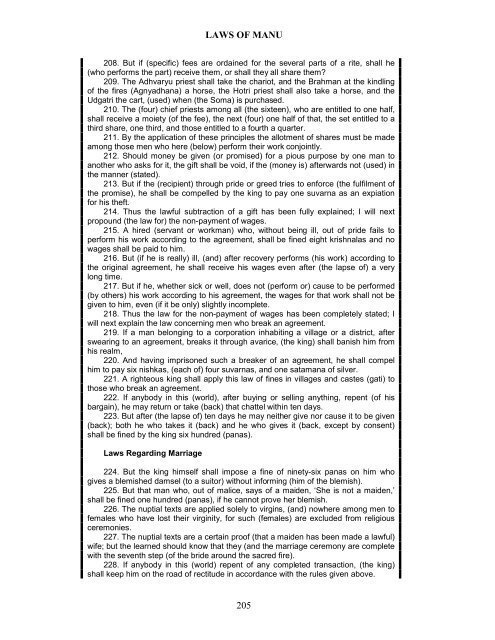You also want an ePaper? Increase the reach of your titles
YUMPU automatically turns print PDFs into web optimized ePapers that Google loves.
LAWS OF MANU<br />
208. But if (specific) fees are ordained for the several parts of a rite, shall he<br />
(who performs the part) receive them, or shall they all share them?<br />
209. The Adhvaryu priest shall take the chariot, and the Brahman at the kindling<br />
of the fires (Agnyadhana) a horse, the Hotri priest shall also take a horse, and the<br />
Udgatri the cart, (used) when (the Soma) is purchased.<br />
210. The (four) chief priests among all (the sixteen), who are entitled to one half,<br />
shall receive a moiety (of the fee), the next (four) one half of that, the set entitled to a<br />
third share, one third, and those entitled to a fourth a quarter.<br />
211. By the application of these principles the allotment of shares must be made<br />
among those men who here (below) perform their work conjointly.<br />
212. Should money be given (or promised) for a pious purpose by one man to<br />
another who asks for it, the gift shall be void, if the (money is) afterwards not (used) in<br />
the manner (stated).<br />
213. But if the (recipient) through pride or greed tries to enforce (the fulfilment of<br />
the promise), he shall be compelled by the king to pay one suvarna as an expiation<br />
for his theft.<br />
214. Thus the lawful subtraction of a gift has been fully explained; I will next<br />
propound (the law for) the non-payment of wages.<br />
215. A hired (servant or workman) who, without being ill, out of pride fails to<br />
perform his work according to the agreement, shall be fined eight krishnalas and no<br />
wages shall be paid to him.<br />
216. But (if he is really) ill, (and) after recovery performs (his work) according to<br />
the original agreement, he shall receive his wages even after (the lapse of) a very<br />
long time.<br />
217. But if he, whether sick or well, does not (perform or) cause to be performed<br />
(by others) his work according to his agreement, the wages for that work shall not be<br />
given to him, even (if it be only) slightly incomplete.<br />
218. Thus the law for the non-payment of wages has been completely stated; I<br />
will next explain the law concerning men who break an agreement.<br />
219. If a man belonging to a corporation inhabiting a village or a district, after<br />
swearing to an agreement, breaks it through avarice, (the king) shall banish him from<br />
his realm,<br />
220. And having imprisoned such a breaker of an agreement, he shall compel<br />
him to pay six nishkas, (each of) four suvarnas, and one satamana of silver.<br />
221. A righteous king shall apply this law of fines in villages and castes (gati) to<br />
those who break an agreement.<br />
222. If anybody in this (world), after buying or selling anything, repent (of his<br />
bargain), he may return or take (back) that chattel within ten days.<br />
223. But after (the lapse of) ten days he may neither give nor cause it to be given<br />
(back); both he who takes it (back) and he who gives it (back, except by consent)<br />
shall be fined by the king six hundred (panas).<br />
Laws Regarding Marriage<br />
224. But the king himself shall impose a fine of ninety-six panas on him who<br />
gives a blemished damsel (to a suitor) without informing (him of the blemish).<br />
225. But that man who, out of malice, says of a maiden, ‘She is not a maiden,’<br />
shall be fined one hundred (panas), if he cannot prove her blemish.<br />
226. The nuptial texts are applied solely to virgins, (and) nowhere among men to<br />
females who have lost their virginity, for such (females) are excluded from religious<br />
ceremonies.<br />
227. The nuptial texts are a certain proof (that a maiden has been made a lawful)<br />
wife; but the learned should know that they (and the marriage ceremony are complete<br />
with the seventh step (of the bride around the sacred fire).<br />
228. If anybody in this (world) repent of any completed transaction, (the king)<br />
shall keep him on the road of rectitude in accordance with the rules given above.<br />
205


















